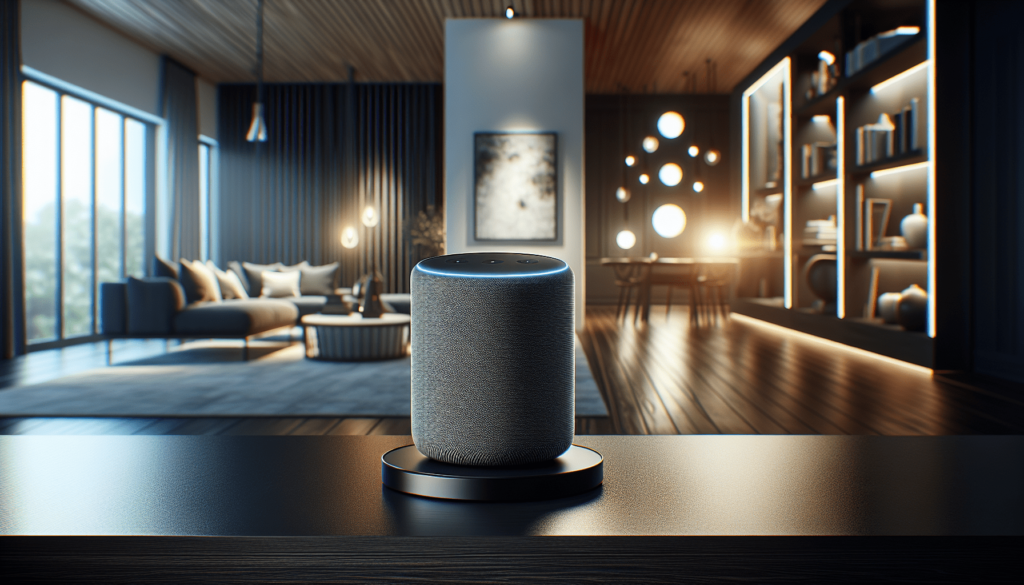So you’re looking to bring the convenience and functionality of a smart speaker into your home, but with the abundance of options out there, it can be overwhelming to pick the perfect one. No worries, we’ve got you covered! In this article, we’ll provide you with some helpful tips to navigate through the sea of smart speakers and find the one that suits your needs, whether you’re a music enthusiast, a smart home aficionado, or simply looking for some voice-activated assistance. So get ready to welcome your new voice-controlled companion and make your life a whole lot easier!

Consider the Smart Assistant
Choose between Amazon Alexa, Google Assistant, and Apple Siri
When choosing a smart speaker, the first decision you need to make is which smart assistant you prefer. Amazon Alexa, Google Assistant, and Apple Siri are the three main options available on the market. Each assistant has its own unique features and capabilities, so it’s important to consider which one aligns best with your needs and preferences.
Consider the features and capabilities of each smart assistant
Each smart assistant offers a range of features and capabilities that can enhance your smart home experience. For example, Amazon Alexa is known for its vast library of skills, which are like apps that allow you to perform different tasks using your voice. Google Assistant, on the other hand, is known for its ability to provide personalized recommendations and search results based on your preferences. Apple Siri integrates seamlessly with other Apple devices, allowing for a seamless user experience across your Apple ecosystem. Consider which features are most important to you and choose the smart assistant that offers them.
Research compatibility with other smart devices in your home
Before making a final decision, it’s crucial to research the compatibility of each smart assistant with the other smart devices in your home. Check if the smart assistant is able to connect and communicate with your existing devices. For example, some smart speakers are specifically designed to work with certain brands or platforms, while others are more universally compatible. Make sure that the smart assistant you choose will be able to control all the devices you currently have, as well as any future smart devices you may purchase.
Determine the Speaker Quality
Check the audio specifications such as frequency response and power output
One of the most important factors to consider when choosing a smart speaker is the quality of the audio it produces. To determine the speaker quality, look at the audio specifications provided by the manufacturer. Pay attention to factors such as frequency response, which measures the range of audio frequencies the speaker can reproduce, and power output, which indicates how loud the speaker can get. Higher frequency response and power output generally result in better sound quality.
Consider the number and arrangement of speakers for optimal sound
In addition to the technical specifications, consider the number and arrangement of speakers in the smart speaker. Multiple speakers and a well-designed arrangement can create a more immersive sound experience. Look for speakers that offer stereo sound or even surround sound capabilities for a more realistic and enjoyable audio experience.
Read reviews and listen to audio samples if available
To get a better understanding of the speaker quality, it can be helpful to read reviews from other customers and experts. Look for reviews that specifically mention the audio quality and see what others have to say about it. Some retailers may provide audio samples or demonstrations in-store, which can give you a firsthand experience of the sound quality. Taking the time to research and listen to audio samples can help you make a more informed decision.

Evaluate the Connectivity Options
Ensure the smart speaker has Wi-Fi capability
To take full advantage of the features and capabilities of a smart speaker, it’s important to ensure that it has Wi-Fi capability. Wi-Fi connectivity allows the smart speaker to connect to the internet and access a wide range of services and functions. Without Wi-Fi capability, the smart speaker may be limited in its ability to provide information, play music from streaming services, or control smart home devices.
Check if it supports Bluetooth for wireless audio streaming
In addition to Wi-Fi, it can be useful to check if the smart speaker supports Bluetooth connectivity. Bluetooth allows you to wirelessly stream audio from your smartphone, tablet, or computer to the smart speaker. This can be particularly convenient if you want to play music from a device that is not connected to the same Wi-Fi network as the smart speaker. Bluetooth compatibility gives you more flexibility in terms of audio sources.
Consider additional connectivity options like NFC or Ethernet
Some smart speakers offer additional connectivity options beyond Wi-Fi and Bluetooth. For example, Near Field Communication (NFC) allows for quick and easy pairing between your smart speaker and other NFC-enabled devices. Ethernet connectivity can provide a more stable and reliable connection for those who prefer wired options. Consider if these additional connectivity options are necessary for your setup and if they would enhance your overall experience.
Assess the Size and Design
Consider the available space in your home for the smart speaker
When choosing a smart speaker, it’s important to consider the available space in your home where you plan to place it. Measure the area to ensure that the speaker will fit comfortably without obstructing other objects or taking up too much space. Additionally, consider the height of the speaker if you plan to place it on a shelf or countertop. Taking the time to assess the size of the speaker will help you choose a model that fits well within your home.
Choose a design that fits your aesthetic preferences
Smart speakers come in a variety of designs, ranging from sleek and modern to more traditional styles. Consider your personal aesthetic preferences and choose a design that fits your home decor. A smart speaker that matches the overall style of your home will blend in seamlessly and enhance the visual appeal of the space. Remember that the smart speaker will likely be a prominent feature in the room, so choose a design that you find visually pleasing.
Balance between portability and capabilities if you plan to move the speaker around
If you plan to move the smart speaker around your home or even take it with you on-the-go, consider the portability of the device. Look for models that are lightweight and compact, making them easy to transport. However, keep in mind that smaller, more portable speakers may have fewer features and capabilities compared to larger models. It’s important to strike a balance between portability and the desired capabilities to ensure you choose a smart speaker that meets your needs.

Research Voice Recognition Accuracy
Read user reviews and expert opinions on the smart speaker’s voice recognition
Voice recognition is a crucial aspect of any smart speaker, as it allows you to control the device hands-free using your voice. To determine the accuracy of a smart speaker’s voice recognition, take the time to read user reviews and expert opinions. Look for feedback specifically regarding the device’s ability to understand and respond correctly to voice commands. While no voice recognition system is perfect, choosing a smart speaker with high accuracy can greatly enhance your user experience.
Consider the speaker’s ability to understand accents and dialects
In addition to general voice recognition accuracy, consider whether the smart speaker can understand different accents and dialects. Some smart speakers may struggle to accurately interpret certain accents or dialects, leading to frustration and misinterpretation of voice commands. If you have a particularly strong accent or speak in a dialect that differs from the speaker’s default language, it’s important to choose a smart speaker that can handle these variations effectively.
Check if the device has a far-field microphone for better performance
A far-field microphone is an important feature to look for in a smart speaker, especially if you plan to place it in a larger room or at a distance from where you typically speak. Far-field microphones are designed to pick up voice commands from a distance without being affected by background noise or other audio sources. This enhances the accuracy and responsiveness of the voice recognition system. When researching smart speakers, check if the device has a far-field microphone for optimal performance in various environments.
Explore Smart Home Integration
Ensure the smart speaker is compatible with your existing smart home devices
If you already have smart home devices in your home, it’s important to ensure that the smart speaker you choose is compatible with them. Check if the smart speaker supports the same protocols or platforms as your existing devices, such as Zigbee, Z-Wave, or even specific platforms like Alexa, Google Home, or HomeKit. Compatibility between your smart speaker and smart home devices will allow you to control all of them seamlessly using voice commands or a central hub.
Check if it supports popular smart home platforms like Alexa, Google Home, or HomeKit
Even if you don’t currently have smart home devices, you may want to consider future-proofing your setup by choosing a smart speaker that supports popular smart home platforms like Alexa, Google Home, or HomeKit. These platforms offer a wide range of compatible devices and allow for easy integration and control. By choosing a smart speaker that is compatible with these platforms, you’ll have a wider selection of smart devices to choose from in the future.
Consider the ability to control multiple devices with voice commands
Another aspect to consider when exploring smart home integration is the ability to control multiple devices with voice commands. Some smart speakers allow you to create routines or scenes, which enable you to control multiple devices simultaneously with a single command. For example, you could say “goodnight” to your smart speaker, and it could turn off all the lights, lock the doors, and adjust the thermostat. This level of automation and convenience can greatly enhance your smart home experience.

Consider Privacy and Security Features
Review the privacy policy and data handling practices of the smart speaker manufacturer
Privacy and data security are important considerations when choosing a smart speaker. Review the privacy policy and data handling practices of the smart speaker manufacturer to ensure that your personal information and data will be handled securely. Look for companies that have a transparent and privacy-focused approach, and consider the reputation of the manufacturer regarding data protection. Taking the time to investigate the privacy and security features of a smart speaker can help ensure your peace of mind.
Check if the speaker has a physical mute button or privacy mode
To give you more control over your privacy, some smart speakers come equipped with a physical mute button or privacy mode. This allows you to disable the microphone and prevent the smart speaker from listening to your conversations. Having a physical mute button gives you the ability to easily and quickly turn off the microphone whenever you desire. If privacy is a top concern for you, consider choosing a smart speaker that offers these physical privacy features.
Consider the level of encryption and security measures implemented
In addition to privacy features, consider the level of encryption and security measures implemented by the smart speaker manufacturer. Look for devices that use strong encryption protocols to protect your data and ensure secure communication between the speaker and other devices. Manufacturers that prioritize security and regularly release software updates to address vulnerabilities are generally more trustworthy options. Carefully reviewing the security features and reputation of the manufacturer will help you choose a smart speaker that prioritizes your data security.
Compare Price and Value
Set a budget for your smart speaker purchase
Before diving into the details of specific models, it’s a good idea to set a budget for your smart speaker purchase. Smart speakers can vary in price depending on their features, capabilities, and brand. By setting a budget, you can narrow down your options and focus on the models that fit within your price range. Keep in mind that more expensive smart speakers may offer additional features or higher-quality components, but there are also affordable options that offer great value for money.
Compare the features and capabilities offered by different models
Once you have a budget in mind, it’s time to compare the features and capabilities offered by different smart speaker models within your price range. Look for models that offer the specific features that are most important to you, such as voice recognition accuracy, smart home integration, or audio quality. Consider which features are essential and which ones are nice-to-have, and prioritize accordingly. Comparing the features offered by different models will help you choose a smart speaker that meets your needs and provides the best value for money.
Read reviews to gauge the overall value for money
To get a better understanding of the overall value for money of a smart speaker, it can be helpful to read reviews from other customers and experts. Look for reviews that specifically mention the value for money aspect and see if others feel that the smart speaker delivers on its promises. Reading reviews can provide valuable insights into the user experience, durability, and long-term satisfaction with the product. By considering the overall value for money, you can make a more informed decision and choose a smart speaker that meets your expectations.

Try Out Voice Control and Smart Features
Visit a local store to experience the smart speaker’s voice control in person
While researching online can give you a lot of information about a smart speaker, nothing beats experiencing it in person. Visit a local store that has smart speakers on display and take the opportunity to try out the voice control features yourself. Interact with the smart speaker and see how well it responds to your commands. This hands-on experience will give you a better sense of the device’s performance and whether it meets your expectations.
Explore the range of smart features like weather updates, news briefings, and smart home control
In addition to voice control, explore the range of smart features offered by the smart speaker. Smart speakers can provide a wide range of functionalities beyond playing music, such as weather updates, news briefings, and even smart home control. Take the time to explore these features and consider how they align with your needs and lifestyle. If you’re particularly interested in certain features, check if the smart speaker you’re considering offers them and whether they meet your expectations in terms of functionality and ease of use.
Consider the ease of setup and user-friendly interface
When choosing a smart speaker, it’s important to consider the ease of setup and the user-friendly interface. A device that is difficult to set up or requires technical expertise may lead to frustration and a less-than-optimal user experience. Look for smart speakers that offer straightforward setup processes and intuitive user interfaces. Reading reviews and user feedback regarding the ease of setup and user-friendliness can provide valuable insights into the user experience and help you make the right choice.
Consider Customer Support and Warranty
Check the warranty provided by the smart speaker manufacturer
When making a purchase, it’s always a good idea to check the warranty provided by the smart speaker manufacturer. Warranties can vary in duration and coverage, so it’s important to understand what is included in the warranty and how long it will cover the device. A longer warranty period can provide added peace of mind in case any issues or defects arise. Additionally, consider the reputation of the manufacturer when it comes to honoring warranties and providing customer support.
Research the customer support reputation and responsiveness
Customer support can play a significant role in your overall experience with a smart speaker. Research the customer support reputation and responsiveness of the manufacturer before making a purchase. Look for reviews or testimonials from other customers regarding their experience with customer support. Consider factors such as response times, the helpfulness of support representatives, and the overall satisfaction of customers. Choosing a smart speaker from a manufacturer known for their excellent customer support will ensure that you have assistance and guidance whenever you need it.
Consider extended warranty options for added peace of mind
If you want an extra layer of protection for your smart speaker, consider purchasing an extended warranty. Many retailers offer extended warranty options that go beyond the standard manufacturer’s warranty. These extended warranties can provide coverage for a longer period of time and offer additional benefits such as expedited support or coverage for accidental damage. While extended warranties are optional, they can provide added peace of mind and protect your investment in the long run. Carefully review the terms and conditions of any extended warranty before making a decision.
Choosing the perfect smart speaker for your home requires careful consideration of various factors. By considering the smart assistant, speaker quality, connectivity options, size and design, voice recognition accuracy, smart home integration, privacy and security features, price and value, voice control and smart features, as well as customer support and warranty, you can make an informed decision that suits your needs and preferences. Take the time to research, compare, and even try out different models to find the smart speaker that will enhance your smart home experience and bring convenience and enjoyment to your daily life.










